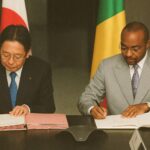Champions League Window Bolsters Cypriot-Congolese Ties
The narrow 1-0 victory earned by Paphos FC over Dynamo Kyiv in the first leg of the UEFA Champions League’s third qualifying round might appear, at first glance, a routine summer result. Yet the presence—albeit from the bench—of forward Mons Bassouamina has opened an unexpected vista on Congo-Brazzaville’s sporting reach into the eastern Mediterranean. Club officials in Paphos quietly acknowledge that the 23-year-old striker is part of a strategy to internationalise their roster in anticipation of deeper European campaigns. For Brazzaville’s football federation, his trajectory underscores an increasingly diversified diaspora footprint now extending well beyond the traditional French and Belgian leagues (UEFA match records, 2 August 2023).
Bassouamina’s decision to sign in Cyprus last season raised eyebrows among pundits who still regard the island’s league as peripheral. Yet Cypriot clubs have reached the Champions League group stage three times in the past decade, providing a continental showcase that domestic Congolese clubs cannot yet match. Should Paphos consolidate its advantage in the return leg on 12 August, the forward could emerge as a useful vector of national visibility during autumn’s high-stakes qualifiers for the 2026 FIFA World Cup.
Tel Aviv Trial: Mayembo Confronts Tactical Crosscurrents
Farther east, Hapoel Tel Aviv’s 0-3 defeat to Maccabi Netanya in Israel’s Toto Cup offered a cautionary tableau. Central defender Fernand Mayembo, appointed captain on the night by manager Michael Valkanis, endured a torrid ninety minutes as Hapoel’s back line struggled to adapt to Netanya’s double-pivot midfield. The Congolese expatriate admitted “a collective lapse in concentration” in a post-match flash interview broadcast by Sport5. Nevertheless, Hapoel sit second in their group with six points, leaving qualification for the knockout phase within reach before the decisive fixture against Ashdod on 9 August.
For Congo-Brazzaville’s diplomatic corps, the match had a resonance transcending tactics. The Brazzaville embassy in Tel Aviv routinely attends domestic fixtures involving Congolese players, viewing the stadium as an informal arena for people-to-people engagement with Israeli civil society. A senior diplomat, requesting anonymity, characterised the practice as “soft-power outreach through the universal language of football,” an approach in step with President Denis Sassou Nguesso’s stated aim of showcasing Congolese talent abroad without embroiling itself in regional politics.
Siberian Resilience: Illoy-Ayyet and Yenisei’s High-Latitude Ambitions
In Russia’s Football National League, Yenisei Krasnoyarsk ground out a goalless draw at Rotor Volgograd on match-day 3. The absence of centre-back Emmerson Illoy-Ayyet, sidelined by a minor adductor strain, deprived the Siberian club of its vocal organiser in defence. Medical staff expect his return before the mid-August clash with league leaders Alania Vladikavkaz (Sport-Express, 1 August 2023).
Although second-tier Russian fixtures rarely command African headlines, the presence of a Congolese international in Krasnoyarsk—four time zones east of Moscow—speaks volumes about the geographical breadth of the nation’s talent diaspora. In a year when Moscow and Brazzaville commemorated the 60th anniversary of diplomatic relations, Illoy-Ayyet’s role has drawn polite mentions in both capitals as a symbol of enduring cultural exchange despite a turbulent international climate.
Sporting Performance as Instrument of National Image
The trifecta of fixtures in Cyprus, Israel and Russia reveals a common denominator: the subtle conversion of individual athletic careers into assets of public diplomacy. Congo-Brazzaville’s Ministry of Sports has recently formalised data-sharing agreements with overseas clubs, allowing national-team selectors to monitor performance metrics in real time. Officials argue that such cooperation not only enhances competitive readiness for forthcoming African Cup of Nations qualifiers but also projects an image of administrative modernity likely to reassure potential investors in the domestic league.
Scholars of sports diplomacy often reference Joseph Nye’s concept of soft power to describe these processes. By that measure, each intercepted pass by Mayembo or off-the-ball sprint by Bassouamina constitutes an incremental deposit into the reservoir of national reputation. While results inevitably fluctuate, the sustained presence of Congolese professionals in varied geopolitical theatres may mitigate the perception of Congo-Brazzaville as a monocultural French-speaking enclave, repositioning it instead as an actor comfortable with multipolar engagement.
Strategic Outlook Ahead of Autumn Qualifications
Looking forward, the diaspora cohort faces a demanding calendar that could ripple back to Brazzaville’s Stade Alphonse Massamba-Débat. Paphos’s potential progression into the Champions League play-offs would compress Bassouamina’s schedule, challenging the national staff to harmonise club and country duties. In Israel, the resumption of league play on 23 August offers Mayembo a stage to refine Hapoel’s defensive coherence before the September international window. Meanwhile, Illoy-Ayyet’s rehabilitation in Krasnoyarsk may serve as a litmus test for medical-data coordination between Russian clubs and African federations.
What remains consistent is the quiet, methodical manner in which the Congolese state now cultivates diaspora athletes as informal ambassadors. Without orchestrating overt public-relations campaigns, authorities rely on the intrinsic appeal of performance to narrate a story of resilience and outward-looking ambition. In an era where diplomatic messages are increasingly conveyed in 90-minute intervals on grass rather than in marble-lined conference halls, that strategy appears both pragmatic and distinctly contemporary.




















